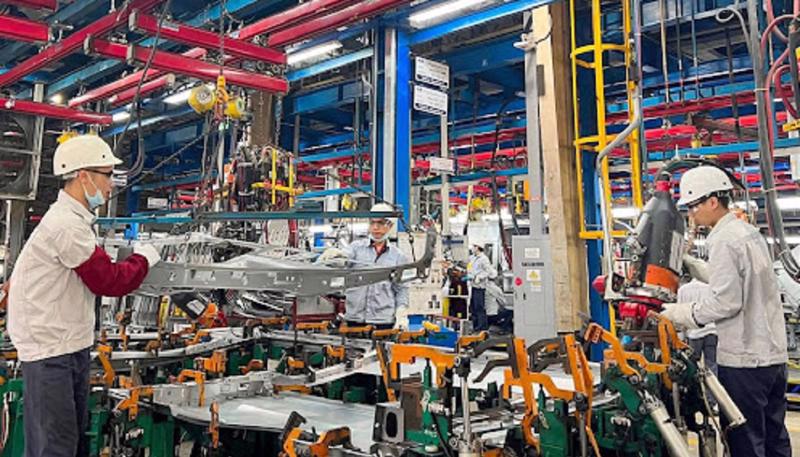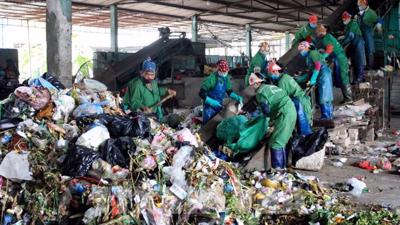Key contributors to business growth
The important role that Vietnam’s business community plays was the focus of a recent meeting held in celebration of Vietnam Entrepreneurs Day

After nearly 40 years of the “Doi Moi” (Renovation) process, Vietnam’s business community has experienced substantial growth in both quantity and quality. Some local enterprises have gone on to secure regional and global recognition, significantly enhancing Vietnam’s standing and reputation around the world.
In early October, at a meeting with permanent government members and businesspeople in Hanoi in celebration of Vietnam Entrepreneurs Day (October 13), Prime Minister Pham Minh Chinh emphasized that this day honors entrepreneurs and encourages them to contribute further to the nation.
In his remarks at the meeting, Minister of Planning and Investment Nguyen Chi Dung said there are currently over 930,000 active businesses in Vietnam, around 14,400 cooperatives, and more than 5 million business households. In the first nine months of this year, more than 183,000 enterprises entered or re-entered the market after a period of suspension.
These enterprises are crucial for generating wealth and material resources, and contribute significantly to economic growth, create jobs, increase worker incomes, and aid in poverty alleviation and social stability. Enterprises and entrepreneurs currently account for about 60 per cent of Vietnam’s GDP, 85 per cent of total employment, and 98 per cent of all import-export value.
Underutilization of entrepreneurial potential
State budget revenue in the first nine months is projected to reach 85.1 per cent of the target, marking a 17.9 per cent increase compared to the same period last year. Total import-export turnover exceeded $577 billion, a 16.2 per cent rise year-on-year, with trade in surplus by an estimated $21.5 billion.
Notably, industrial production has rebounded quickly, becoming a vital driving force for overall economic growth. These positive results are largely attributed to the business community, particularly the private sector.
“The development of entrepreneurs and enterprises still faces challenges, as the potential and opportunities for growth have not been fully leveraged,” Minister Dung emphasized. He noted that the government, alongside the Prime Minister, is dedicated to supporting the business community through robust institutional reforms and creating a favorable investment and business climate.
Recent surveys indicate a much more optimistic business outlook, reflecting strengthened confidence. The proportion of business respondents that view the macro-economic situation positively over the next 12 months is five-times higher than in the previous survey.
However, Minister Dung pointed out that the development of Vietnam’s entrepreneurial community still encounters limitations. Most enterprises are small in scale, with limited competitiveness, operational efficiency, and management capabilities. Some still hold a “seasonal” business mindset and lack strategic vision. The number of large companies capable of leading supply chains remains low. The levels of connectivity, cooperation, and the ability to take advantage of opportunities from international economic integration and Industry 4.0 are still insufficient.
Moreover, a segment of the business community lacks ethics, business culture, legal compliance, social responsibility, and national spirit, which has led to legal violations. The implementation of mechanisms and policies designed to encourage and support businesses has been slow, and administrative reforms aimed at enhancing the investment and business environment have not yet met the necessary requirements.
Uplifting SMEs
In response to such challenges, Minister Dung highlighted the need for government regulatory bodies to prioritize resolving difficulties by reviewing and simplifying administrative procedures. It is essential to genuinely support and stand by businesses, adhering to the Prime Minister’s directive of “What is promised must be accomplished; commitments must be fulfilled; and actions must lead to tangible results.” Creating a favorable investment climate that ensures equal access to resources and support policies without discrimination among various economic sectors is crucial.
There should be a strong emphasis on decentralization and the delegation of authority. Immediate reviews and amendments of regulations, business conditions, standards, and technical requirements that do not reflect reality must be undertaken, with close consultation from the business community throughout the process of developing and revising legal documents. Additionally, there is a need to formulate and refine policies aimed at training a high-quality workforce equipped with skills, in-depth professional knowledge, international standards, and professionalism. Mechanisms for high-quality workforce training at various levels should be established.
The Minister also urged enterprises themselves to proactively innovate their business approach, enhance their management capabilities, productivity, quality, and competitiveness, and foster creativity, research and development, and the application of advanced science and technology.
It is vital to continue promoting the national spirit and unity to establish the Vietnamese brand in global markets, encouraging collaboration between Vietnamese enterprises aimed at achieving common values and mutual benefits, and strengthening accountability to the community, society, the nation, and ethnic groups.
Mr. Nguyen Van Than, Chairman of the Vietnam Association of Small and Medium Enterprises (VINASME), said local businesses possess the capability to organize, implement, and manage large projects. Only 3 per cent of enterprises in Vietnam are actually classified as large, most of which operate across multiple sectors and industries. Large enterprises play a critical role in the economy and domestic value chains. The government needs to assign specific tasks and implement tailored support policies for large enterprises, to enable them to focus on developing key sectors.
To lift up small and medium-sized enterprises (SMEs), he recommended that the government place greater emphasis on support policies for medium-sized enterprises in the near future.
Three strategic breakthroughs
In his closing remarks, Prime Minister Chinh emphasized that amid the intertwining difficulties, challenges, opportunities, and advantages, where challenges outweigh opportunities, the government, ministries, sectors, and local authorities must prioritize creating a transparent, supportive, and equitable business environment for enterprises and entrepreneurs. This includes establishing an economic institution aligned with socialist-oriented market principles that ensures fair and healthy competition between different economic sectors.
It is essential to develop comprehensive, modern, and synchronous strategic infrastructure, including transportation, energy, and telecommunications, to enhance the competitiveness of products, businesses, and the overall economy.
“The goal is to create a transparent institutional framework, seamless infrastructure, and intelligent governance to support business growth,” he remarked. “The government, ministries, and local authorities should focus on actions rather than words; commitments must be fulfilled. There should be no empty rhetoric, no mention of difficulties without solutions, and actions must result in specific, measurable outcomes.”
Furthermore, the Prime Minister called on businesses and entrepreneurs to take the initiative in driving three strategic breakthroughs: institutional development, infrastructure enhancement, and human resources improvement. They should lead in advancing science and technology, leverage advancements from Industry 4.0, innovate, and revitalize traditional growth drivers. There should also be a focus on establishing modern corporate governance to bolster the country’s management capabilities, promoting a smart, transparent, and integrity-driven government that serves the people.







